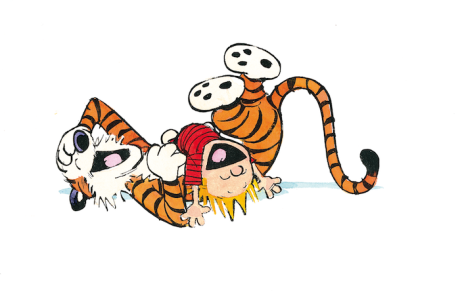5 Lessons We Learned From Bill Watterson’s Calvin & Hobbes

28 years ago today, on November 18, 1985, we were introduced to Calvin & Hobbes and their inventive world, imagined by cartoonist Bill Watterson. And last Friday, a documentary film about the impact of the comic strip, Dear Mr. Watterson, hit theaters. (Physical copies of the film will ship December 15, and The Essential Calvin and Hobbes, The Authoritative Calvin and Hobbes, and The Indispensable Calvin and Hobbes, have recently been released on e-book for the first time.) It’s a hotly anticipated moment for those of us who grew up with Calvin in the Sunday paper and had a collection of dog-eared Calvin & Hobbes books on our bedroom floors. (I can remember writing “Lauren Passell, Girl Of Destiny” on the top of my fourth-grade homework assignments and hosting “Swift Kick In The Butt, $5” booths outside my home on lazy summer afternoons, completely copying Calvin’s imaginative ideas.) And it makes us remember the infinite wisdom we gained by entering Calvin’s world. Dear Mr. Watterson: thank you. Here are five things you taught us in bringing Calvin and his tiger friend to life.
1. Do Things The Other Way
This rule is best exemplified in Calvin’s made-up game Calvinball, in which the rules, equipment, and perameters are undefined and made up on the go. In the game and in life, Calvin doesn’t let society’s standards dictate how he functions: he does things the way he thinks is best, whether his thinking is against the grain or not. (Preferably, it is.) The only rule in Calvinball, actually, is that no rule can be used more than once, proving that rules are often best thrown out the window. Calvin teaches us to stretch and challenge our imaginations, make our own rules, and let our creativity take the lead.

2. Perception Is Reality
Hobbes, as well as the inventive world Calvin lives in, is a figment of Calvin’s imagination. Or is he? It doesn’t matter. If a cardboard box can be a time machine, for all intents and purposes, it is. If the backyard can be an unexplored planet, it is. If a stuffed tiger can be your best friend, he is. These things are as real to Calvin as school and bedtime, maybe even more so. We can all find importance in the things we love, even if they seem insignificant or silly to others. Sometimes you have to ignore someone when they tell you, “that isn’t real.”
3. Don’t Grow Up Until You Have To
Calvin embraces playtime and freedom, and by entering his world, we’re invited to do the same. His perfect day is a day spent exploring in his backyard or building a village of evil snowmen. He appreciates the quiet moments of curling up next to the fire with his best friend, Hobbes. It might be the kind of stuff that all kids do, but getting to enter Calvin’s word as adults reminds us that those things are there and we’re not too old to enjoy them.
4. School Isn’t Where You Learn
Calvin pokes fun at his classes—he realizes that his intelligence isn’t defined by how he does on a test. He’s wise beyond his years…yet struggles to do simple math problems or class projects. And it’s clear it’s not because he isn’t smart enough to master them, but because he’s thinking beyond what’s being asked of him. On one test, when asked when the Pilgrims landed at Plymouth Rock, Calvin answers, “1620. As you can see, I’ve memorized this utterly useless fact long enough to pass a test question. Now I intend to forget it forever. You’ve taught me nothing except how to cynically manipulate the system. Congratulations.” He understands the system and is willing to play the game, but not blindly. He’s always a step ahead of his teachers and his parents, questioning what he’s learning, and trying to take more from the lessons than that’s on offer.
5. Find what you love and do it.
This lesson comes from Watterson himself. He could have made millions had he decided to make his comic a franchise. (I had a stuffed tiger that I called Hobbes, and if there had been a copyrighted Hobbes doll, I would have begged my parents to buy it for me. And had there been Calvin & Hobbes sheets and lunch boxes, I would have wanted those, too.) But Watterson didn’t write and draw to make money, and he was skilled enough that he didn’t have to. We’d all be lucky to find something that we’re so good at we don’t have to compromise our dreams to do it. It’s been estimated that Watterson could have made up to $400 million franchising his creation. But he loved his work so much that the money didn’t interest him. And we could all feel that every time we read a new strip. (Or one that we’d read one hundred times before.)
What did Calvin & Hobbes teach you?
